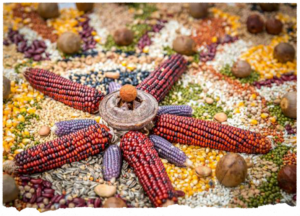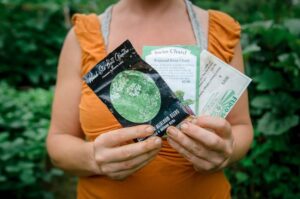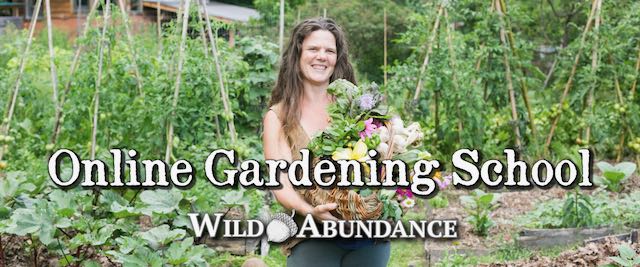We’re excited to share a list of independent garden seed companies from all over the United States. These are companies that we’ve bought from, learned from, and/or been inspired by. It’s by no means an exhaustive list. If you have an addition to suggest, please email us at gardening@wildabundance.net.
During this time of food-growing frenzy (yay!), many of these companies have been overwhelmed with orders and sold out of some seeds. We hope this list helps you find a garden seed company that has what you’re looking for, and that operates in line with your values.
“Let us remember and rejoice that nearly every bite that passes our lips connects back eventually to the generosity of a seed…I know this much is true; I hear the peaceful rumblings of a new revolution, one where we reclaim the seeds from the hands of corporations, and back into the hands of the people. The seeds and the seed-songs belong to the people of this earth, people of all colors and all traditions.”
Rowen White, Mohawk farmer, storyteller, teacher, writer and seedkeeper, Sierra Seeds
The Problems with Corporate Seed Monopolies
Seeds contain multitudes! They are, indeed, the foundation of the world’s diverse food systems, and of your next meal. Seeds are like tiny treasures, full of memory, patience, and possibility, all at the same time.
For the majority of human history, seeds of food and medicine plants were cared for, cultivated, and shared as sacred living members of the human family. Indeed, this community-based “system,” rooted in respect, is still alive today in many parts of the world. Yet, over the past 100 or so years, the seed industry has ballooned in tandem with its equally misguided sister, the agrochemical industry.


The same companies that breed, engineer, and sell much of the world’s seeds also produce the chemicals those seeds were bred and engineered to rely upon (source: Canadian Biotechnology Action Network). Not only is this problematic because it traps farmers in dependency on these companies for both seeds and chemicals, but it also strips the seeds of two of their most powerful qualities: diversity and relationship.
Seeds grow and change in relationship with people and places. This means they can adapt in order to thrive in a vast array of different conditions, and to meet the needs of farmers all over the world. When giant corporations develop seeds with profit as their north star, farmers, eaters, communities, environments, and the seeds themselves suffer. In a changing world, we need diverse, bio-regionally adapted seeds, now more than ever. You can read more on the dangers of seed monopolies here.
Seed Companies We Love
Natalie and Chloe, lead instructors for our Online Gardening School, usually buy seeds from just a few seed companies: Southern Exposure Seed Exchange, FedCo Seed Co-op, Adaptive Seeds, and Johnny’s Selected Seeds. This is, in part, because it’s cumbersome and expensive to buy from a million different companies (even though they’re excited to support everyone on the list below). Also, they’ve found seeds from these sources to grow well here, in their gardens in southern Appalachia. And they appreciate and approve of these companies’ growing, sourcing, and management practices.
Remember: seeds grow and change in relationship with people and places. Meaning you’ll likely have the best success with seeds that were grown and selected under similar growing conditions to your own.
Independent and Bio-Regionally Adapted Garden Seed Companies in the U.S.
How exciting and hopeful that this list is so long! We encourage you to support these breeders, growers, distributors, and educators with your dollars and love. Many of them offer more than just seeds. In fact, when you peruse their websites, you’re likely to find how-to videos, planting guides, stories, and other opportunities to learn and connect.
To learn more about planting and tending over 25 vegetables, berries, and herbs, plus foundational garden know-how like managing soil, weeds, pests, and more, check out our Online Gardening School.
Southeastern US:
Southern Exposure Seed Exchange (VA)
Sow True Seed (NC)
Heavenly Seed (SC)
Garden Medicinals and Culinaries (VA)
Two Seeds in a Pod (WV)
Northeastern US:
True Love Seed (PA)
Fruition Seeds (NY)
Hudson Valley Seed Company (NY)
High Mowing Organic Seeds (VT)
Midwestern US
Meadowlark Hearth (NE)
Small House Farm (MI)
Prairie Garden Seed (Saskatchewan)
North Circle Seeds (MN)
Good Seed Company (MT)
Snake River Seeds (ID)
Clear Creek Seeds (OK)
Prairie Moon Nursery (MN, native plants and shrubs)
California
Redwood Seeds (CA)
Renee’s Garden (CA)
Quail Seeds (CA)
Refining Fire Chiles (CA)
Pacific Northwest
Restoration Seeds (OR)
Adaptive Seeds (OR)
Territorial Seeds (WA)
Uprising Organics (WA)
Southwestern US
Seeds Trust (CO)
Native Seeds SEARCH (AZ)
Deep South
Growin’ Crazy Acres (FL)
South Georgia Seed Company (GA)
For Sweet Potato Slips
Southern Exposure Seed Exchange (VA)
George’s Plant Farm (TN)
Sand Hill Preservation Center (IA)
For Seed Potatoes
Moose Tubers (ME)
Filaree Farm (WA)
Peaceful Valley (CA)




